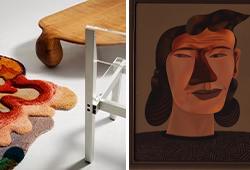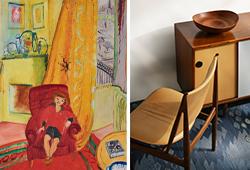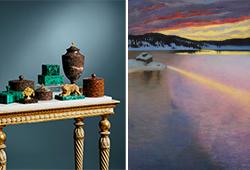Carl Larsson
Martina and the Food Basket (studie till "Frukost i det gröna")
Signed CL and dedicated "To Martina". Executed 1910. Oil on canvas 60 x 80 cm.
Provenance
Martina Westergren, gifted by the artist.
Thence by descent in the family.
Literature
Ulwa Neergaard, "Carl Larsson. Signerat med pensel och penna", 1999, illustrated in colour p. 472 and listed in the catalogue under the year 1910, p. 130, no 1397.
More information
Anna Martina Eriksson (1886 - 1967) worked as a maid for the Larsson family in Sundborn, in the school household in Falun and in Stockholm - everywhere the family lived for a longer time. Martina has told how she came to Sundborn at the age of 18 - ‘I had a friend called Anna Arnbom, who was a maid for the Larsson family. One day in February she took me there. I stayed there for fifteen long years. There was a bright and happy atmosphere in the Sundborn home. I felt at home from the very first moment.’
One morning when she was on her way into the dining room with the breakfast tray, Carl Larsson was inspired to paint her. The result was the well-known painting ‘Martina with the breakfast tray’, painted in 1904. The painting was bought by the Museo d'Arte Moderna in Venice in connection with the exhibition there in 1907. It became well known in Swedish homes as ‘Martina with the breakfast tray’ was the cover image of the cookbook Hemmets Kokbok until 1965. Martina, also known as 'The sunshine of the Sundborn family', appears in several of Carl Larsson's paintings, including ‘Martina by the fire’, ‘Christmas Eve’ and ‘Breakfast in the Green’.
Martina was a valued person and an important part of the household and family. A number of handwritten letters and postcards from Carl Larsson, Karin Larsson and daughters Brita and Lisbeth accompany this catalogue number. A personal birthday greeting from Carl Larsson testifies to her status as a close member of the family. Carl Larsson has written a poem and drawn Martina and the the birthday gift, a chest of drawers with a mirror waiting for her at the carpenter's. As a thank you for her long and faithful service, Martina received the Kartbacken property as a gift from Carl Larsson. The deeds of gift for Kartbacken are included in this lot.
‘Martina with the breakfast basket’ is one of the preliminary studies for the monumental, almost legendary painting ‘Breakfast in the Green’ by Carl Larsson. In this study, the artist has squared up the canvas and sketched the maid Martina as she unpacks the breakfast basket. Martina is dressed in her favourite colours of red and white. The stripes on the flowing wide sleeves of her blouse form an elegant pattern that contrasts with the plain red skirt. The starched white apron billows as she bends down over the basket. On the ground is a stack of blue and white porcelain plates. Martina's face, her curls sticking out from under her cap, the fall of her dress, the basket and the porcelain are all exquisitely executed with Carl Larsson's sure lines. The birch trunks and the sumptuous breakfast table remain sketchy and as viewers we are invited to take part in the artistic process. Carl Larsson worked on the motif ‘Breakfast in the Green’ for three years and Bukowskis has previously sold the sub-motifs ‘Bodakulla’ and ‘Lisbeth by the Birch Trunk’, both dated 1910. At the top right, the artist has dedicated this study ‘To Martina’. In an interview published in the Dalademokraten on 25 November 1965, she describes how it happened : ‘My dear little Martina,’ Carl Larsson once said, ‘the children have each had their own sketch, and now you will have yours.
Then Mr Larsson gave me this fine painting,‘ says Martina, showing the unparalleled delightful work.’
‘Breakfast in the Green’ is one of Carl Larsson's most famous motifs from Sundborn. In the early 1890s, Carl Larsson began to depict the family's everyday and festive life in their home Lilla Hyttnäs in Sundborn, which they had received as a gift from Karin's father in 1888. The family's idyllic life and healthy living became stylistically formative in the creation of the ideals of the early 1900s.
After depicting the seasons of the family's life in watercolour, Carl Larsson decided in the early summer of 1910 to paint a monumental family picture in oil with an outdoor motif. He had long been thinking about a picnic in the birch grove on the island of Bullerholmen, which lay opposite Lilla Hyttnäs. On 1 August, Karin wrote to the children, who were staying in different places: ‘Father has now planned a large family picture on Bullerholmen’.
Suzanne travelled home from her work as a nurse in Domnarvet and Brita and Kersti returned from Stralsund in Germany. When the family gathered in August in Sundborn, work on the painting could begin. In the first version, a sketch in watercolour 65 x 98 cm (sold in 1912 via Fritzes Hovbokhandel for SEK 2,000), Karin is in the centre between the birch trees, and in the foreground her daughter Lisbeth dominates, leaning against a birch trunk. It is likely that the content was the same in the large oil, 193 x 408 cm, which was sent to Rome in early 1911 together with the watercolours from the series ‘To the Sunny Side’ to be exhibited at the ‘International Art Exhibition’. When the oil painting came back, Carl Larsson continued to work on the painting, the cast of which changed until 1913 when he considered himself finished. In the final version, the youngest son Esbjörn is sitting between the birch trees listening to a old man playing his violin and Karin Larsson has been replaced by some bright red chairs. Karin can be found on the other side of the Sundborn River, where she and the artist himself seem to be waiting to be picked up for the breakfast that has been laid out. The children have gathered around the table, Kersti is sprinkling flowers over Pontus, Suzanne with a big hat is standing with her sister Britta in pretzels and admiring the table setting, and the maid Martina is picking up the last of the goodies from the basket together with her dog Kicki. Carl Larsson also painted a number of oil and watercolour sub-motifs of ‘Breakfast in the Green’. The large oil and partial motifs are all symbols of the season of summer and the Swedish tradition of eating outdoors with family and friends. ‘Breakfast in the Green’ was purchased in 1946 by the Norrköping Art Museum from the estate of Carl and Karin Larsson.
Photo: Martina Westergren, by photographer Bo Trenter.
A birthday greeting from Carl Larsson to Martina.
A letter dated September 3, 1906 with instructions from Carl Larsson to Martina.
Artist
Carl Larsson is considered one of the greatest Swedish artists of all time. He was born in Gamla Stan in Stockholm and studied at the Royal Academy of Arts in the years 1866-76. After his studies in Stockholm, he traveled to France and settled in Grèz-sur-Loing. There he mainly painted garden motifs. In France, he met his future wife Karin Bergöö, who was also an artist and came to mean a lot for his artistry. Already during his student years, he made a living as a photo retoucher and cartoonist in the press. It was also during his studies that Larsson got to know Anders Zorn and Bruno Liljefors, together the three are usually called the ABC artists. At the end of the 1880s, Carl and Karin were given "Lilla Hyttnäs" in Sundborn outside Falun by Karin's father, and this is where Larsson's most famous watercolors depicting his family were created. The motifs often depict sunny landscapes with children, crayfish fishing, meals in the green and interior scenes. Larsson is represented, among other, in the National Museum, where "Gustav Vasas intåg i Stockholm" and "Midvinterblot" fills the stairwell. Represented mainly at the National Museum in Stockholm and at the Gothenburg Art Museum.
Read more

























